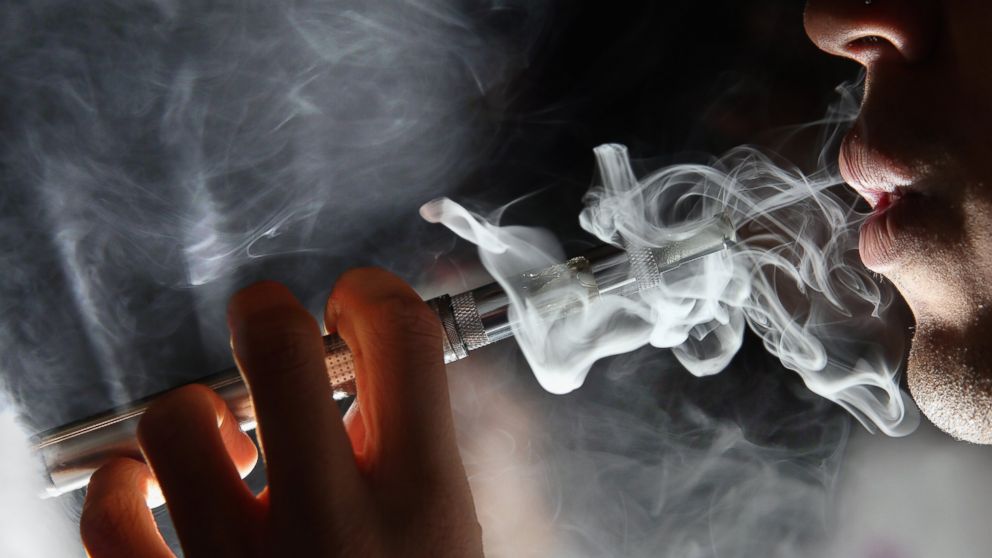Teens Who Vape May Be More Likely to Smoke Cigarettes Later, Study Finds
New study adds to growing body of research on the effects of vaping on teens

— -- Even though rates of teen smoking are on the decline, a new study finds that teens who use e-cigarettes are more likely to light up their first traditional cigarette.
The link was found to be even stronger for teens who never intended to smoke cigarettes, according to the study published today in the journal Pediatrics.
“Historically most adults who are smoking started smoking early in life,” postdoctoral researcher and lead study author Jessica Barrington-Trimis told ABC News.
She said most people who currently smoke started before age 18, but still the connection was a surprise. “We really weren’t expecting to see that much uptake. We found pretty high rates of initiation amongst e-cig users.”
Researchers from the University of Southern California followed two groups of high school juniors and seniors (about 300 in total) who had never smoked cigarettes before. The groups were nearly identical in most regards except for one crucial difference; one group of teens used e-cigarettes and the other did not. An average of 16 months later, 40 percent of the e-cig users went on to start smoking cigarettes, compared to only 10 percent of the non-e-cig users. At the beginning of the study, the investigators asked the teens if they had a firm commitment to not smoke cigarettes. Amongst the teens who said they did not want to go on to smoke cigarettes, those who used e-cigs had a greater odds of going on to smoke cigarettes.
“These kids are expressing a pretty firm commitment not to smoke,” at the beginning, said Barrington-Trimis. “E-cigarettes may be eroding this intention not to smoke, or introducing the kids to nicotine. But more research is needed; we don’t really have enough data to sort it out.”
Barrington-Trimis said the study did not look at whether the kids who reported trying cigarettes are just experimenting, or will go on to become regular smokers.
Gregory Conley, president of the nonprofit American Vaping Association, pointed out that teens are smoking less.
"The fact that there is an association between a willingness to try a vapor product and later experimentation with smoking is neither new information nor particularly helpful in evaluating the public health impact of vaping,” Conley told ABC News. “The bottom line is that as more teens have experimented with vapor products, youth smoking has experienced massive and unprecedented declines that no one predicted just five years ago.”
Cynthia Cabrera, executive director for the Smoke-Free Alternatives Trade Association, disputed the study’s findings, pointing out that teen smoking has continued to decrease.
“The [methodology] is flawed and the data does not prove that e-cigarette use among teens prompted smoking with the study’s own authors concluding that the risk between vaping and smoking is unknown,” Cabrera told ABC News. “The fact is there is no gateway effect between the two since the National Institute of Health’s Monitoring the Future (MTF) survey actually found decreases in teen smoking and e-cig use over the last two years, and just a few days ago, the CDC reported that smoking among teens has hit dramatic lows over the past two years."
New data from the U.S. Centers for Disease Control and Prevention released last Thursday shows an all-time low in cigarette smoking in high-schoolers, but a sharp increase in those who vape. Nearly one in four high schoolers report vaping in the month before they were surveyed for the 2015 Youth Risk Behavior Surveillance System — a large increase from 2011 when the CDC-sponsored Youth Tobacco Survey reported 1 in 20 teens vaping.
“This is very concerning because adolescents will become addicted to nicotine after much less exposure to nicotine than adults,” Dr. Karen Wilson, associate professor of pediatrics at the University of Colorado Anschutz Medical Campus and chair of the American Academy of Pediatrics Section on Tobacco Control, told ABC News. “Using e-cigarettes in and of themselves is not a safe behavior.”
Dr. Alex Sable-Smith is a resident in family medicine at the University of Colorado Anschutz Medical Campus. He is currently a resident in the ABC News Medical Unit.